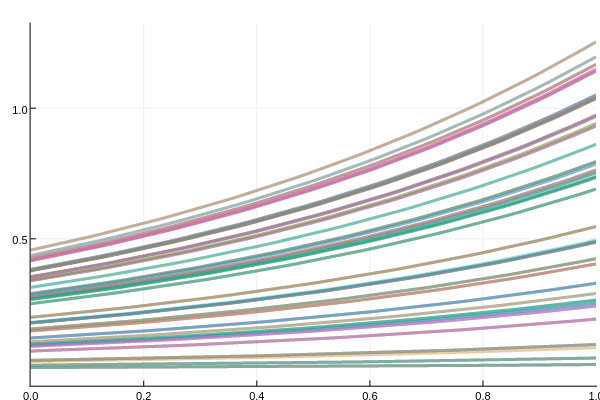Parallel Monte Carlo Simulations
Performing a Monte Carlo Simulation
To perform a Monte Carlo simulation, you simply use the interface:
sim = monte_carlo_simulation(prob,alg,kwargs...)The keyword arguments take in the arguments for the common solver interface. The special keyword arguments to note are:
num_monte: The number of simulations to run
In addition, one can specify a function u0_func which changes the initial condition around. For example:
function prob_func(prob)
prob.u0 = randn()*prob.u0
prob
endmodifies the initial condition for all of the problems by a standard normal random number (a different random number per simulation). This can be used to perform searches over initial values. If your function is a ParameterizedFunction, you can do similar modifications to f to perform a parameter search. One then passes this function via:
sim = monte_carlo_simulation(prob,alg,prob_func,kwargs...)Parallelism
Since this is using pmap internally, it will use as many processors as you have Julia processes. To add more processes, use addprocs(n). See Julia's documentation for more details.
Solution
The resulting type is a MonteCarloSimulation, which includes the array of solutions. If the problem was a TestProblem, summary statistics on the errors are returned as well.
Plot Recipe
There is a plot recipe for a AbstractMonteCarloSimulation which composes all of the plot recipes for the component solutions. The keyword arguments are passed along. A useful argument to use is linealpha which will change the transparency of the plots.
Example
Let's test the sensitivity of the linear ODE to its initial condition.
addprocs(4)
using DiffEqMonteCarlo, DiffEqBase, DiffEqProblemLibrary, OrdinaryDiffEq
prob = prob_ode_linear
prob_func = function (prob)
prob.u0 = rand()*prob.u0
prob
end
sim = monte_carlo_simulation(prob,Tsit5(),prob_func,num_monte=100)
using Plots
plotly()
plot(sim,linealpha=0.4)Here we solve the same ODE 100 times on 4 different cores, jiggling the initial condition by rand(). The resulting plot is as follows:
